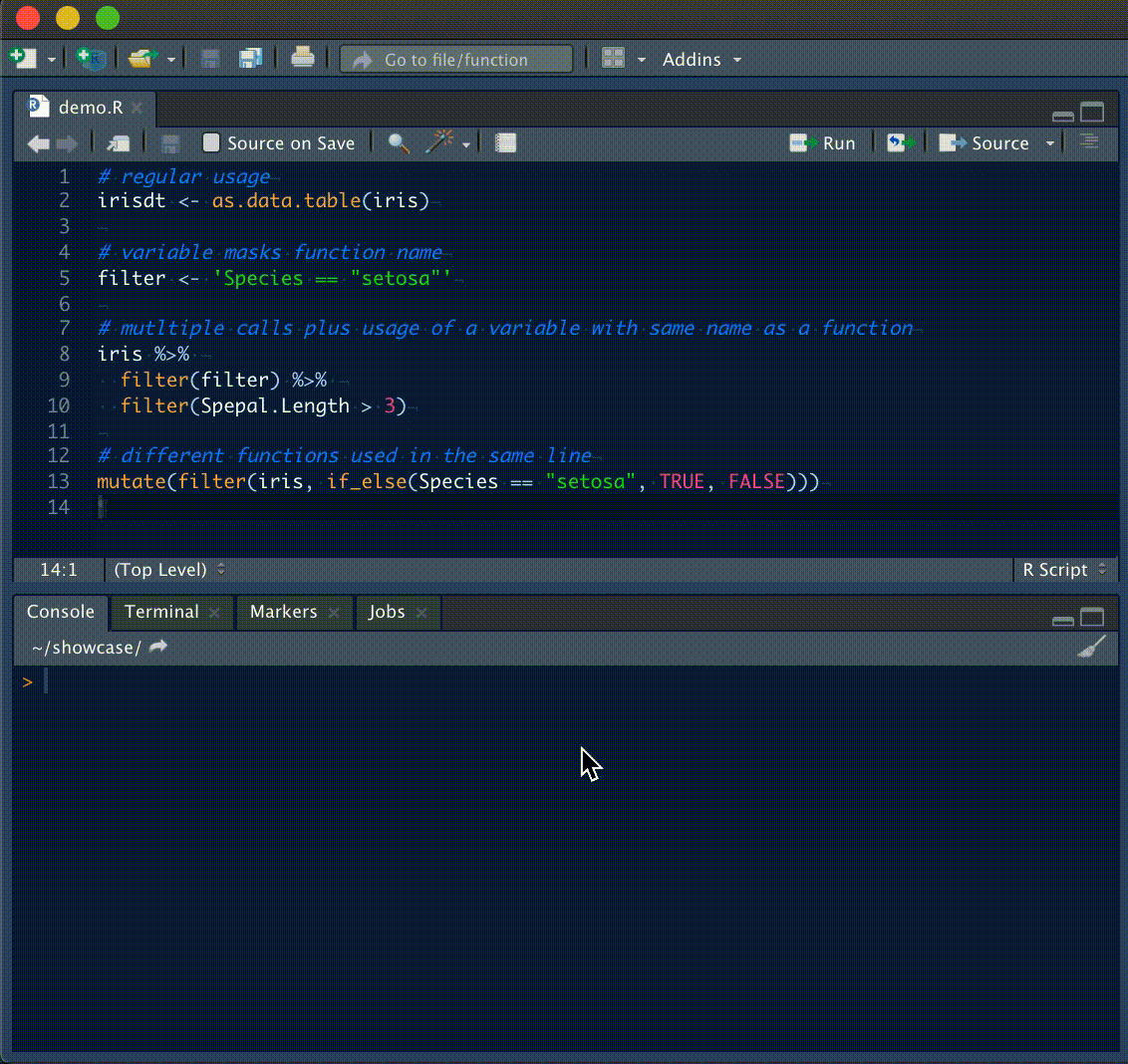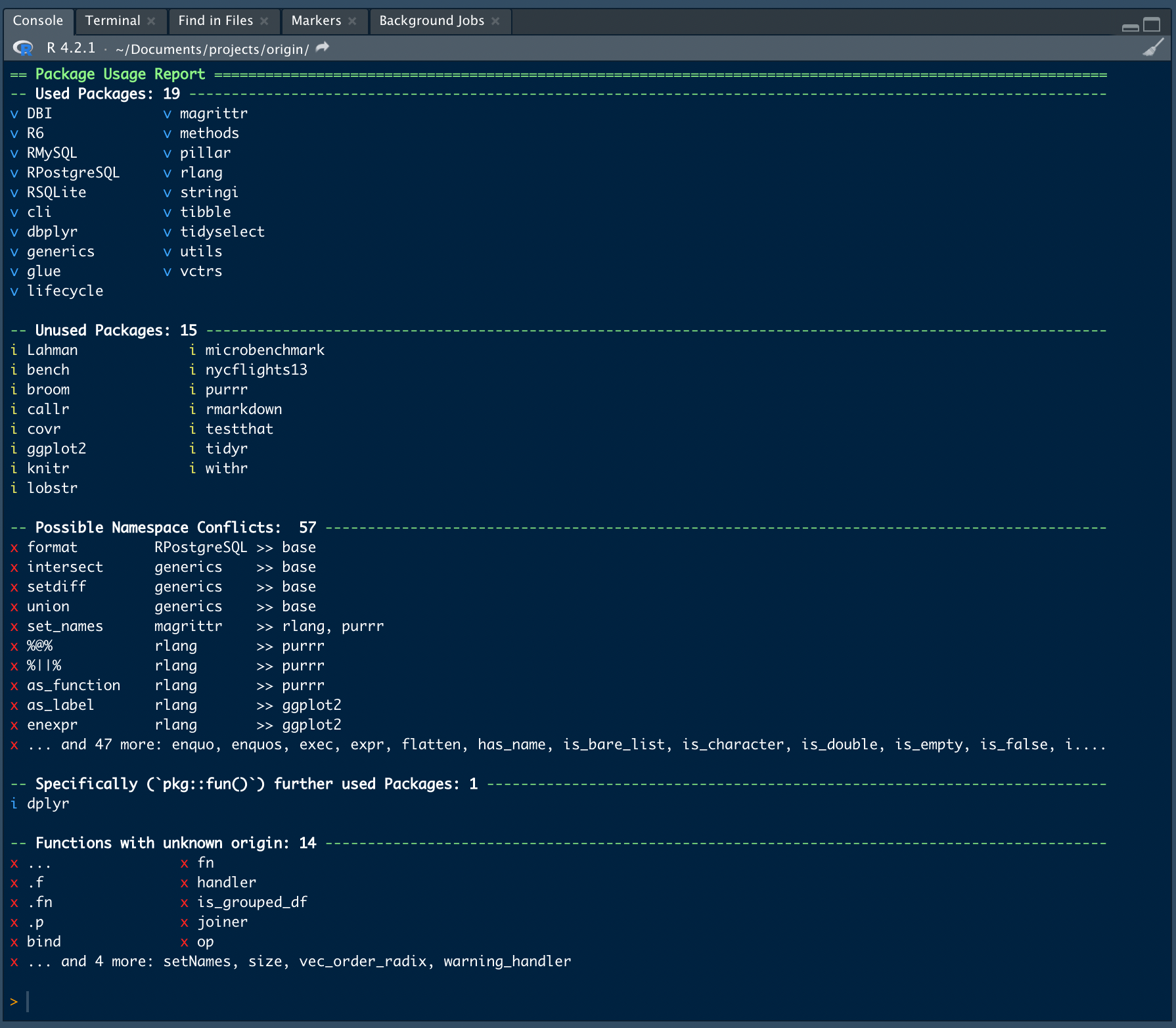

| branch | main | dev |
|---|---|---|
| R CMD check | ||
| test coverage |  |
 |
| lints |
An R package that adds pkg:: to functions to be more
explicit
To install the latest version use
remotes::install_github("mnist91/origin")
origin adds the correct package specification to all
functions in your script while giving full control about the outcome.
This makes it much easier to both convert legacy code into the
pkg::fun() convention as well as it allows you to write
short code first and adapt it later.

Additionally, it provides an overview of all
actually used packages in a project. That means, it
does not only check which packages are called via
library(), require(), etc. but determines
which functions from which packages are eventually used. Useful for
quickly checking a project for which packages are actually still needed
when dealing with a huge barrage of library calls.

To originize code either use the delivered RStudio addins or call the
origin functions directly,
i.e. origin::originize_file or
origin::originize_dir.
origin::originize_file("testfile.R", pkgs = c("dplyr", "data.table"))Again, either use the delivered RStudio addin or call the function explicitly
origin::check_pkg_usage(path = ".",
pkgs = c("dplyr", "data.table"),
use_markes = FALSE)Most argument defaults of origin functions can be set
via options(). This is especially useful when using the
RStudio Addins.
origin.pkgs: which packages to check for functions used
in the code (see Considered Packages).origin.ask_before_applying_changes: whether changes
should be applied immediately or the user must approve them first. Note
that this mutes all checks, i.e. large number of files, local functions
mask exported functions, and the presence and order of function
conflicts.origin.overwrite: actually insert pkg::
into the code. Otherwise, logging shows only what would happen.
Note that ask_before_applying_changes still allows to keep
control over your code before origin changes anything.origin.check_conflicts: should origin
check for potential namespace conflicts, i.e. a used function is defined
in more than one considered package. User input is required to solve the
issue. Strongly encouraged to be set to TRUE.origin.add_base_packages: should base packages also be
added, e.g. base::sum().origin.check_base_conflicts: Should origin also check
for conflicts with base R functions.origin.check_local_conflicts: Should origin also check
for conflicts with locally defined functions anywhere in your project?
Note that it does not check the environment but solely parses files and
scans them for function definitionsorigin.path_to_local_functions: the path to the root
directory of all local functions. defaults to the project root of the
currently opened project in RStudio.origin.excluded_functions: a (named) list of functions
to exclude from checking. See details.origin.verbose: some sort of logging is performed,
either in the console or via the markers tab in RStudio.origin.use_markers_for_logging: whether to use the
Markers tab in RStudio.origin.color_added_package: hex code highlighting
insertions.origin.color_missed_function: hex code highlighting
potential missings.origin.color_infix_function: hex code highlighting
infix functions (see discussion).origin.filetypes: Which filetypes to consider. Now
origin supports .R, .Rmd, and .Qmd (Quarto) files.By default, orgigin considers all attached packages as
given by .packages() except the standard R packages
(base, methods, stats,
utils, graphics, datasets). For
the current list of loaded packages also check search().
Note that, in case of namespace conflicts, the order in the search list
determines which namespace masks which. origin uses the
same rule as R, i.e. the latest loaded package masks the other packages.
Therefore, in case there is a potential namespace conflict in your code,
the changes made by origin should yield the same result as
before but being more explicit about it. Since this can break code
functionality, origin issues a warning and user input is
required.
To overwrite the default just use a character vector of package names.
Especially useful to solve namespace conflicts or
ignore infix functions like the pipe operator %>%.
Listed functions are not considered by origin neither in
adding pkg:: nor logging. It is a list of function names.
When unnamed, the function is generally excluded. To be more specific, a
named list excludes functions from these packages only.
Examples:
# unnamed list
opitions(origin.excluded_functions = list("last", "%>%", "%<>%"))
# named list
opitions(origin.excluded_functions = list(data.table = c("last", %between%),
magrittr = c("%>%", "%<>%")))
# both named and unnamed
opitions(origin.excluded_functions = list(data.table = c("last", %between%),
"%>%", "%<>%"))The logging highlights three cases: - insertion: pkg::
is inserted prior to a function - missing: an object that has the same
name as a function but not undoubtedly used as a function. In R it is
usually no problem to have variables that name like functions (data or
df are popular examples). While it is always clear when a function is
directly used as one, functions can also be arguments of other
functions, most famously in functional programming like the *apply
family or purrr. origin highlights such cases in the
logging output. - infix: functions like %>% are exported
by packages but cannot be called with the pkg::fun()
convention. Such functions are highlighted by default to point the user
that these stem from a package. When using dplyr-style code, consider to
exclude the pipe-operator via exclude_functions.
Whether or not to add pkg:: to each (imported) function
is a controversial issue in the R
community. While the tidyverse style guide does not mention explicit
namespacing, R Packages and the Google
R style guide are in favor of it.
Pros
Cons
(minimal) performance issue
more writing required
longer code
infix functions like %>% cannot be called via
magrittr::%>% and workarounds are still required here.
Either use
library(magrittr, include.only = "%>%")
`%>%` <- magrittr::`%>%`calling library() on top of a script clearly
indicates which packages are needed. A not yet installed package throws
an error right away, not until a function cannot be found later in the
script. However, one can use the include_only argument and
set it to NULL. No functions are attached into the search
list then.
library(magrittr, include_only = NULL)